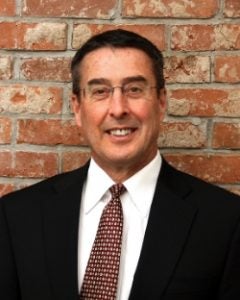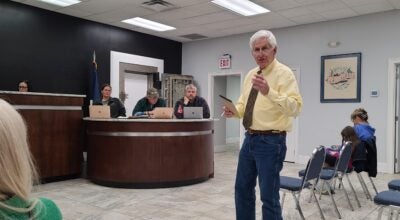Proposed health care bills could have big impact locally
Published 8:59 am Thursday, June 29, 2017
All political opinions and biases aside, something most will agree on is our national health care system has become broken.
Adding to that, dissecting the most recent information from the U.S. House and the Senate on exactly what they think should be changed seems as difficult as figuring out what broke it to begin with.
The proposals
Senate leaders had wanted a vote on the proposed bill by July 4, but that proved too difficult for the Senate Majority Leader, Kentucky’s own Mitch McConnell, the driving force behind the closed-door sessions drafting it. More Republicans voiced they were against the bill than McConnell could afford to lose. As of now, the status of the bill is “delayed.”
There are graphs and charts floating around the internet showing the differences between the Affordable Care Act (also known as “Obamacare”); the American Health Care Act proposed by the House; and the Better Care Reconciliation Act proposed by the Senate. The Senate bill is very similar to the House bill, but some reports claim the Senate’s is better due to offering lower, cheaper coverage for younger, healthier people while offering more help to older people. The Senate bill is designed to offer tax credits to help pay premiums — credits which are based on age and income.
At first glance, the Senate bill keeps some of the more popular aspects of Obamacare in place — most notably the pre-existing condition clause, requiring insurers to cover them, regardless.
But the bill also gives states “waiver authority” to opt out of that requirement. Under this plan, a myriad of benefits required by Obamacare could be dropped — anything from prescription drug coverage to maternity leave.
The House bill allows states to get permission to let insurers charge more for some pre-existing conditions, and can exclude some people altogether, but states would have access to federal money to help with policies or conditions that prove to be more expensive. The Senate draft bill lets states ask permission to reduce required coverage, giving insurers more discretion over what they offer and charge.
Both bills aim to block any federal funding to Planned Parenthood for a year, and neither would allow tax credits to be used to pay for policies from any provider that covers abortions.
‘An incredible impact on Kentucky’
One of the biggest changes in both bills is Medicaid coverage. Medicaid is paid for by state and federal dollars, providing care for those in a low income bracket and for the disabled. After Obamacare was enacted, many states participated in Medicaid expansion —Kentucky was one of these — which served to cover households with incomes of up to 138 percent of the federal poverty line.
Under the House bill, the Medicaid expansion would be cut after 2020; under the Senate bill, the Medicaid expansion cuts would begin in 2021.
This would mean pressing rewind on the expansions, and then allowing states a set amount for each person enrolled. Payments made to states would be calculated differently, reducing the federal government’s contributions.
“That’s really scary, if you think about it,” says Boyle Public Health Director Brent Blevins. “Now they (people on Medicaid) have got insurance and they’ve figured out where to go and how to get care, then you take it away.
“Now they’re back in the free market and they can’t afford it, and they’re going to use the emergency room for their primary care … walk-in clinics will be in even bigger demand. It’s an overriding concern for me. To me, that’s a huge issue.”
According to the Cabinet of Health and Family Services, 1.4 million people in Kentucky are covered by Medicaid, with just under 500,000 of those covered thanks to the expansion. As of May 2017, there were 8,517 people in Boyle County who are covered by Medicaid.
“Of course, the flip side is that Kentucky’s budget is not good, and to pay for expanded Medicaid is almost impossible,” Blevins continues. “Just for the health department, you’re going to see people showing up needing primary care or specialized care that we don’t have. Most of ours is preventative care, so where are those people going to go?”
Only a handful of health departments Blevins knows of offer full-time physicians. Most have nurse practitioners who are focused on a specialization, so handling a huge influx of patients who need primary care is not realistic.
“I mean, yeah. It’s a lot to think about,” Blevins says from his office at the health department, pausing to think. “I mean, it would have an incredible impact on Kentucky. That can overwhelm a system quick.”
Blevins says he is anxious to see the final results of the bill. “I know as a part of Trumpcare, they were looking at getting rid of some immunization funding that goes through CDC (Centers for Disease Control), and that will affect us. Any loss in money will affect us.”
The health department gets about $500,000 from local taxes. Blevins says his budget this upcoming year is $1.3 million, with around $250,000 of that coming from fees and the rest coming in from federal and state grants.
Simply put, Blevins says he has a lot of concerns. The possible elimination of expanded Medicaid has potential to really, really change health care in Kentucky.
“I think hospitals will be even more overrun than they are now. Are we going to become a country with people begging on the corners everywhere for treatment? I don’t know what the answer is.”
The doctors
“The healthcare industry is a broken industry because insurance was never meant to pay for routine healthcare and preventative care in the first place,” says Dr. Jeremy Stich with Access Med in Danville. “It was meant to pay for the unexpected medium- and high-cost items and emergencies.”

Dr. Jeremy Stich
Stich says think about it: We don’t use auto insurance to fill up our gas tanks or change our oil. “But it has become standard to use health care insurance to pay for the most affordable component of healthcare — primary and preventative care.”
Access Med is a direct care system where patients pay a flat monthly fee with no copays. It’s a different kind of system, Stich says, but is not used in place of insurance.
“We still recommend they carry a high deductible plan. We start (monthly fee) at $50 a month, we dispense wholesale medicines and order basic screens (blood tests, etc.), and prices for those tests range from $20-$30.”
Stich says the problem with insurance coverage is the deductibles can be so high, patients avoid going to the doctor at all. “The whole idea is to improve access, communication and better the relationship between doctor-patients. Studies show patients are less likely to be hospitalized, less likely to need surgeries because they are able to take care of chronic illnesses that otherwise would get ignored.”
AccessMed also takes Medicaid.
“I anticipate (what’s proposed in the new health care bill) would increase the demand for services,” Stich says. But there’s no cookie-cutter approach, he says.
Until elected officials and the general public understands this, he says it doesn’t really matter how the government addresses the new bill.
“I guarantee there will be unintended consequences, just like with Obamacare,” he says. There will be new unintended wrinkles.
Unfortunately, Stich says it looks like the solution will only come at a grassroots level, when patients and providers come together.
The direct pay system has had quite a growth spurt due to the health care dilemma, Stich says, and clinics are opening across the country. Access Med will open a second location in Lexington this August.
Sarah Hempel says she and husband, Rick — a geriatrician in Danville — have had to drastically change their practice. Dr. Rick Hempel was with patients and unavailable to comment. Sarah Hempel manages his practice.
“I can tell you (Rick) thinks we should do a single-payer system,” Hempel said. She’s referring to a health care system where taxes are paid to cover costs for all residents, regardless of income or health status, much like Canada or the U.K.
A single-payer system is a great idea — in theory, Stich says.
“It’s hard here, in the U.S., where people get what they want, when they want it the way they want it. But we can’t pay for it. It’d be great to have, but probably won’t work here.”
Hempel says something’s got to change. “Our practice is skewed to an older population. The way that insurance reimburses right now, they don’t let you be independent. It really cuts back on the type of health care you want to provide.”
Hempel says a doctor cannot keep seeing 30-40 people a day and give quality health care.
“People won’t even go into primary care anymore. There’s a huge primary care shortage in this area — it almost has to be a calling.” She says her husband plainly tells her, in order to follow the health care model set in place, in another 10 years he won’t be able to practice medicine the way he was taught to.
But, the Hempels see it from both sides. They’re also operating a small business, she says.
“Who knows what’s going to happen,” Hempel says.”On a very personal level, I’m disgusted that this bill was written behind closed doors by all white men. As a woman, it just infuriates me — but that’s a personal opinion.”
Stich isn’t concerned by that fact.
“It concerned me when it was done by non-clinicians,” he says. “I don’t care about the age or the race of who’s making the bill, it should be created by health care providers. That’s the only fear I have about that situation. Too many politicians and too many lobbyists involved. It was the same with Obamacare. That hasn’t changed.”
The attorney
Local attorney Mark Morgan has been representing disabled people in the community and surrounding ones since 1981, and has practiced law since ’77. He and partners have represented diabetics who couldn’t get insulin; clients suffering from schizophrenia who couldn’t get the necessary meds to control their symptoms; people scheduled for lumbar surgeries who were cancelled due to insurance. All of these people, he says, with decades of work history, were making choices between getting their prescriptions filled or paying bills.

Mark Morgan
“I was going to three, maybe four funerals a year for clients who had passed away,” he says — direct results of not getting medical care or medicines. One comes to his mind immediately, a client who ended up taking his own life.
“When Medicaid expanded in Kentucky, that stopped happening. It was a day-and-night transformation. Most of the bad outcomes disappeared.”
Morgan says they’ve documented the objective evidence about what was real, what was really an underlying disability and what was a disability due to lack of access to medical care, and he has proof of the improvements.
“I’m fearful that we’re going to return to the situation we were in before, sitting across the desk from people who can’t get diagnostic testing, can’t get meds and scripts, and I’m going to be going back to funerals again.”
It’s not just affecting the poor
The problems with health care coverage don’t discriminate. Many situated right on the line in the middle class feel the surging bite of higher premiums and ridiculously large deductibles.
“We see people in the economic middle class who are now starting to have to make tough decisions about their health care,” Health Director Blevins says.
Dr. Stich agrees.
“It’s not just low income; it’s also working families. A real typical client for us is someone in their mid 50s with stable factory work behind them, and can’t afford COBRA, which is four times their normal premiums. (They’re) literally faced with losing their home or their kids dropping out of college because they can’t afford it,” Stich says.
“The people we represent say frequently, ‘OK, I won’t get the medicines or go to the doctor,’ and I end up seeing them in the funeral home. And I’m tired of it, and I don’t want to see it any longer,” Morgan says. “Certainly not so that taxes can be cut for the wealthy.”
“I understand the free enterprise of capitalism,” Blevins says. “… But there’s the other side — when you’ve got people who need health care and you’re trying to find providers and money is tight …. I’m not sure going back to a total free enterprise thing will do it. I think people will be right back to where they used to be.”
Blevins says the health department sees its share of the middle class who come in, simply looking for some type of coverage. “I think more middle class people are really struggling these days. These are families who are going to work every day, trying to pay their bills, not living outside of their means, giving to charity when they can, but are still struggling trying to pay medical bills. I think there’s a lot out there like that we don’t realize it.”
Blevins says if cuts go through as planned, he surmises the Family Service Association, “right here, across the street, they will be overrun with people saying ‘I couldn’t pay for my water or my electrical bill because I had to pay for the medicine for my heart.’”







